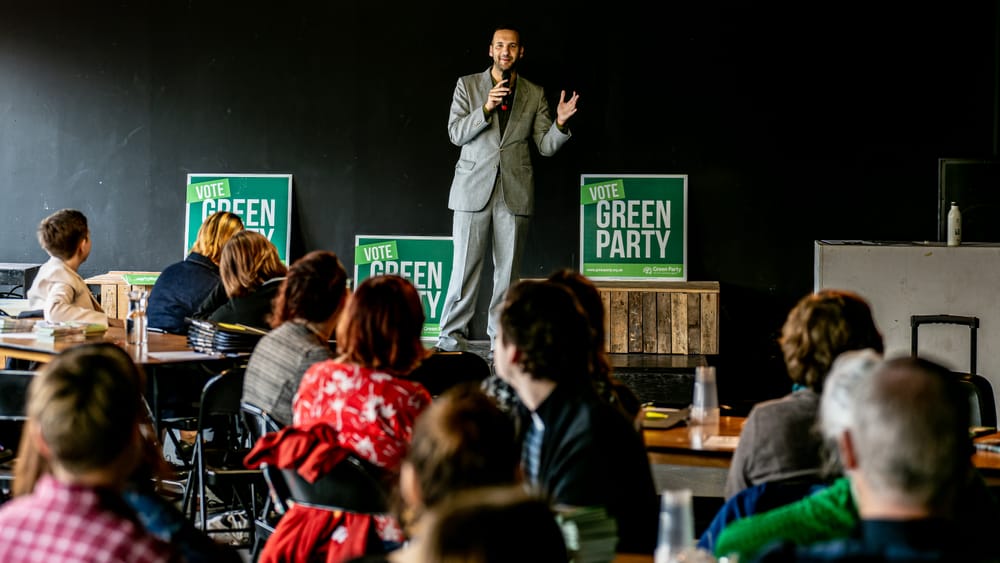‘It’s humiliation as political method’: behind the curtain of the Labour right
A conversation with journalist Paul Holden about his new book The Fraud.

On Monday, investigative journalist Paul Holden’s new book, The Fraud, was published by OR Books. Across nearly 600 pages, Holden details the origins, workings, and wrongdoings of the Labour Together think-tank and those associated with the organisation. Above all, this focuses on its former director, Morgan McSweeney, who also ran Keir Starmer’s Labour leadership campaign, and now serves as his chief of staff in Downing Street.
Prior to its publication, the book made headlines for its exposure of sordid and misogynistic messages sent by a number of the prime minister’s closest aides, leading to the resignation of political strategy director Paul Ovenden and head of communications Steph Driver. There have also been calls for the Electoral Commission to reopen its investigation into the think-tank for having unlawfully failed to declare £740,000 in donations under McSweeney’s directorship, something Labour Together founder and current housing secretary Steve Reed has dismissed.
Earlier this week, Holden and I spoke about the fraudulent politics of the Labour right, the controversies surrounding the revelations in his book, and why they could mean it will soon be curtains for Keir Starmer.
This interview has been edited for length and clarity.
– Eli Machover
Your new book was released this week. Who, or what, is the “fraud” of the title?
It’s multiple frauds really. I call Keir Starmer himself a fraud in the colloquial sense, in that he is a man who misrepresents himself. I think that’s been at the heart of his political methodology since at least early 2020; he constantly presents himself in ways that are just totally untrue.
But then there’s a deeper fraud, starting in 2017 and ending in the 2024 election, of what I call the “Labour Together project”, of which Morgan McSweeney and Steve Reed are the prime movers. They were presenting the think-tank Labour Together as a cross-factional body that wanted to heal the divisions in the party. That fraud was cover for a much darker, more problematic project, which was to destroy the Labour party under Jeremy Corbyn from within, and then rule over the ashes. Part of that was about precipitating the collapse in support for Labour as much as they could, and then preparing to foist a leader on the party they could use to capture and then totally remake it.
This fraud is then repeated again. That’s how I end the book, by arguing that one of the reasons why the Labour party has become so unpopular since Starmer’s election as prime minister, is because they’ve repeated that political methodology.
Do you see this fraudulent politics as now paving the way for the far right?
Look, Labour came into government constrained by their own methodology of achieving power: to empty social democracy of any substance, and then lie to people about what’s going to happen. They’re extremely vulnerable as a result, because people really genuinely hate them, and they hate them because they feel like their trust has been betrayed. Nothing is going to make people feel angrier, more upset, and more alienated with a political project than when they feel like they’ve been systematically lied to.
There was already extreme distrust in politicians, for good reason, after 14 years of the Tories. Public confidence in the political process is extremely low. In that context, the Starmer project has done what they’ve always done, which is to decide who their future opponent is – in this instance Nigel Farage – and copy that person. Just like they copied Rebecca Long-Bailey in the 2020 leadership race, they then copied Rishi Sunak, and now they’re copying Nigel Farage. They’re shadowing his agenda by saying all of his concerns are legitimate, but Labour has more practical solutions.
Why did you choose to publish the material as a book at this conjuncture?
I had wanted to publish this as a book before the last election as a warning to people, but at the time nobody wanted to listen. We have a joke in my household that we were critics of Keir Starmer before it was cool. It used to be a hipster endeavor, but now everyone does it.
The book is having a significant impact in Westminster, and not only because of the disclosure of Labour Together’s failure to declare £740,000 in donations. We have seen an exodus of senior staff from within Starmer’s core team in Downing Street over recent weeks, in part thanks to evidence presented in The Fraud of a number of these staffers engaging in abusive and misogynistic conduct while working in Labour headquarters during Jeremy Corbyn’s leadership of the party.
Some of their behavior has only been made public for the first time in The Fraud, yet this information has been known to journalists for years. Why do you think it’s only now with the publication of your book that this evidence has been brought to the public’s attention?
What I know, or at least what I’ve been told by other people, is that certain of those internal Labour party messages had been taken to the BBC during the 2024 general election, and it wasn’t reported. I then took authenticated files to the BBC later, and they didn’t run the story then either. There was a long period of time when I was being told that there needed to be very detailed editorial discussions. It seemed to me that there was an institutional blockage at the BBC, and eventually I lost patience. I then went to ITV and the response was very different. They were extremely excited and wanted to run with it. Once they verified it, forensically, it was really rapid. [The messages were leaked to the Daily Mail before ITV went live with the story.]
You’ve had a “reputation management firm” on your own back because of what you’ve exposed.
Yes, hired by Labour Together. This organisation has a reputation to manage, and they’re scared. There’s real dirt there, proper dirt. That £740,000 is not going away. The Electoral Commission has said it’s not going to investigate this stuff. I say very bluntly: either the Electoral Commission does its job, or I’ll do its job for it.
Could this really bring down the Starmer administration?
Yes, I think it could. I really do think it’s enough.
As well as detailing the disturbing and unlawful conduct of senior members of the government, the book also traces the essential cruelty of their politics and modus operandi. In particular, it examines the tactics employed by Starmer’s team against leftwing media outlets and the left in the party – including anti-Zionist activists, many of whom were Jewish – during the period of opposition when he was leader, and Corbyn before that. You show how this foreshadowed the Starmer government’s treatment of the most vulnerable people in British society, and the support they’ve offered an apartheid ethnostate perpetrating the genocide of Palestinians.
Absolutely. At the heart of their project is a degree of cruelty and vindictiveness – it’s humiliation as a political method.
I actually had another idea for a book. There are dozens of letters in the Labour party files of leftwing Jewish people accused of antisemitism writing back to the party asking, “What are you doing? What are you thinking? What has gone wrong in your hearts that you’re doing this?” The letter written by Jonathan Rosenhead, a longtime anti-apartheid activist, is one of the most powerful – it is just beautifully written. It’s a four page story of his life and his family’s life, explaining that part of his family had been killed in the Holocaust. He ends by saying, “To accuse me of antisemitism, it makes me think you don’t understand antisemitism as a concept or a practice.”
The person who submitted the allegation against Rosenhead was Steve Reed MP. Reed is not Jewish. I think it’s so emblematic – he’d been working with McSweeney on the Labour Together project, and one of their attack vectors was the notion that the party under Corbyn was overrun by antisemitism and was out of control. In 2020, a month after Reed went into the powerful shadow cabinet position as communities and local government secretary in the new Starmer administration, he sent an email demanding 10 people be suspended and investigated for antisemitism. Four of them were Jewish. In every instance, the Labour party investigated. The bureaucracy was put under lots of pressure to find reasons to expel these people, and they couldn’t find anything. The only person they sent a notice of investigation to was Rosenhead, for a mad reason, and he was so deeply offended by the idea that he was actually going to be investigated by the Labour Party that he resigned.
Obviously, the Corbyn years were nowhere near perfect, but I do think that embedded within Corbynism was a rich vein of humanity, or at least an attempt to recognise that humanity and dignity can have some role in our politics. And that’s gone now. It’s just cruelty and crackdowns. The Joseph Rowntree Foundation has basically said that by the end of this parliament, people’s lives will be worse. If the government can’t offer material benefits to people’s lives, what can it offer? All it can offer is the power of the state.
This is really all the Labour right wing has – an ability to capture a bureaucracy, and then use that bureaucracy to defend their power, usually in terrible ways. The impact of this on the Labour party has been so profound – it’s profoundly negative for half the membership to leave. It’s not a functional organisation. Whatever you might want to say about the Labour party for the last hundred years, it has generally and genuinely been a site for political contestation that’s live, real and dynamic, and it produces ideas and it produces a movement.
In the book you mention Red Shift: Labour’s Path to Power, a pamphlet published by Labour Together in April 2023 that essentially spells out the organisation’s political strategy. There is a conspicuous absence of any mention of the 2017 general election, in which Labour achieved its highest vote share in 16 years – as you note, the authors “simply wipe it from the record”. Why is that the case?
It doesn’t exist to these people. It almost feels like it’s such an offence to their cosmology that they can’t admit that it exists.
Red Shift spends most of its time saying that the one lesson we learned from 2019 is that nobody wanted Jeremy Corbyn as prime minister. It seems to me the one lesson we learned from 2019 is that people who voted for Brexit didn’t like the idea of a second referendum. 52 of the 54 seats that Labour lost in England and Wales had voted for Brexit. It’s not hard to understand the message there. It’s also not hard to understand where the second referendum policy came from, which is basically Keir Starmer. So they have to erase 2017 and rewrite 2019. This faction will forever hold up the 2024 election as proof that their methodology works.
What lessons can the left take from all this?
The test for the left is going to be this: the people who are alienated by Starmer’s Labour party are going to lose faith and trust in the political process, and so the issue is not just going to be capturing the political space, it’s going to be convincing people to care. It’s going to be about convincing people who feel alienated that there is some value in supporting a leftwing project. But that is a very emotionally and politically fragile space to be in, because people are on the constant edge of disaffection and disillusionment. So if you want to bring people over to your movement, you have to treat them with respect, and you have to be spot on with everything you do. That’s the lesson. If you lose that trust, you’re done.
Hopefully that’s not already been lost.
Yes, I worry that has happened, and I think that’s why so many have gone to the Green party now, because there is a sense that maybe the Green party is a machine that seems to be professional. People are asking of the new left party: “is it going to dissipate our trust if we support them?”
That’s where the left is going to struggle, particularly after years of the Labour leadership taking the left wing of their own party and their own core constituency and putting their head in the toilet and flushing it, saying, “You suck! You suck!” And now these people are like “Fuck it, I want go to the Green party or somewhere else that doesn’t flush my head in the toilet.”▼
To donate once or monthly, click here.
Author

Eli Machover is a PhD candidate in politics at the University of Oxford and an editor at Vashti.
Sign up for The Pickle and New, From Vashti.
Stay up to date with Vashti.



